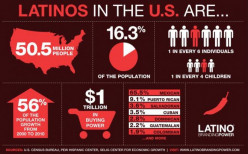Why Latinos Cannot Be Neatly Categorized And Often Misunderstood In
This Society
Latinos are the largest minority group in this society. In addition to that, Latinos cannot be simply categorized into one racial group. Latinos have Caucasian, Mestizo, Native, and African ethnic/racial backgrounds and/or combination thereof. Because of this often ambiguous ethnic/ racial categorization, they are perceived to be a threat to this strict dichotomized societal ethnic/racial categories of Black, Caucasian, and/or Asian
Latinos actually represent and symbolize the racial future of this postmodern society. In addition to their ambiguous racial category, their language is Spanish. Latinos are becoming increasingly educated and affluent. They also possess purchasing dollars and are a large consumer market. Latinos are here to stay.
In fact, Latinos are the original Americans. As the comedian George Lopez aptly stated, "We ain't going nowheres!" Let us embrace Latinos as part of the beautiful ethnic/racial mosaic in postmodern American society! Also, let us discuss the status of the Latino in postmodern American society.To some Americans, Latinos are quite enigmatic because they represent "the other". Their mother/father language is Spanish. Many of them are proud of their heritage. Some go even further to contend that they are the original Americans while non-Latinos are the ones who are immigrants, not them.
Many Americans perceive Latinos to be a threat, especially racially/ethnically. In fact, the Latino will be the prototype of the future American because for the most part, they are racially mixed which some Americans find to be perplexing. Latinos are oftentimes negatively stereotyped as gang members, the underclass, and illegals.
There are Latinos who are highly educated, highly successful, and socioecnomically affluent. Unlike the previous immigrants, Latinos refuse to subvert or forget their respective heritages and language in order become American. There are Americans who are quite uncomfortable with this. Well, so be it. Latinos are going to be a force in America, BELIEVE IT OR NOT.

Here are some links:
http://youtu.be/HzdyfuaEb2I
http://youtu.be/n4PEx1KsrBY
http://youtu.be/3XQ5Zo2_f-w
http://youtu.be/ApMDLhcA37QActually, Asians were the original Americans...
There are Latinos who are either full Native, predominantly native, or partially Native.

Except for non-Latino Natives, Latinos are the original Americans. According to the PBS series, LATINO AMERICANS, one of the first European languages spoken was Spanish.There is also evidence of prehistoric Europeans following the ice pack to the north American continent around the same time. The migration of mammoth hunters may have been from both the East and the West.
http://www.trussel.com/prehist/news168.htm
http://www.nbcnews.com/id/11451616/ns/t … 8vAEPldWyo
Hello, Grace.
Just a quick stop to expand on Wilderness’ point that, in fact, Latinos are not the original Americans.
Consider the studies of Rolando González-José of the University of Barcelona, Spain. "The settlement of the New World is better explained by considering a continuous influx of people from Asia.”
Skulls found at the tip of Baja, CA suggest the first settlers were from Southeast Asia and the southern Pacific area some 13, 500 years ago. It is a finding that now competes with earlier beliefs that the roots of Amerindians lie in migrations from Northern Asia about 12,000 years ago, reaching from Siberia, crossing the land bridge to Alaska, and then spreading down throughout North and South America.{1}
Gosh, that was a hellava long walk. However, none of this changes the essence of this thread. Sorry to interrupt.
However, none of this changes the essence of this thread. Sorry to interrupt.
{1} http://news.nationalgeographic.com/news … skull.htmlInteresting. I had heard rumblings about that migration, but did not know that any specific evidence had been found.
So the Australians floated over and were vanquished and murdered by the evil Asians invading their homeland. Sounds kind of familiar doesn't it? The story of mankind, ever the aggressor.
Seriously, though, it does make one wonder even more. Why are the explorers always from the climate extremes of the planet? Because they were hardened or even driven out by climate changes? Because they were forced into inventing the ability to survive in harsh environments?Greetings my friend.
I would be slow to subscribe to either conquest or climate as major forces pushing very early migration to North America. Food, new breeding mates and just curious wanderlust would be my first guesses.
However, nautical migration has always been harder to support than crossings like the Ice Age land bridge to Alaska. Mostly, I suppose, because Neptune always confiscated the signs and evidence the mariners left behind.
For example, “A competing theory called the "Coastal Migration Theory" contends that the first Americans migrated from Northwest Asia along the northern Pacific coastline of North America in either rafts or some kind of boats.” {1}
Still another theory includes boat people from further South. “The boat-builders from Southeast Asia may have been one of the earliest groups to reach the shores of North America. One theory suggests people in boats followed the coastline from the Kurile Islands to Alaska down the coasts of North and South America as far as Chile.” At least these folks did not have to walk all the way!
Fortunately, all those Asians did not have to face this when they finally got here:

{1} http://www.transpacificproject.com/inde … igrations/No, that's not what I meant. A question that occurs to me is did the nasty climate in the North and far South (compared to Africa) evolve the people somehow to make it possible or desirable to migrate. Not that climate actually drove the migration, but made it possible at the root.
Why did the colder climates do things like migrate long distances when the moderate climates did not?Well damn, since we are already off-topic, I will jump in too.
"...Why did the colder climates do things like migrate long distances when the moderate climates did not?'''"
Duh! (sorry, but it seemed a appropriate). Can we say "Survival" or "Security?" Those seem to be the two choices. 1) The climate dictated the wanderlust, (Quill's words), in instances where life was good and thoughts could be turned to beyond the next meal, or, 2) every one was dying and the tribe had to move on to a more facilitating environment.
I am placing my bets on "security" - subsistence level security was achieved and a combination of "wanderlust" and "betterment of life circumstances" motivated exploration.
Just my 2 cents.
GAThank you very much, GA, for your two cents. Do you want change?
<jk>
Q.Nope. I can afford the extravagance. I am a rich conservative.
GA
Did the climate then force the migration? It seems a simple answer, but one I have a hard time accepting; if it truly was a cause and not just a contributing factor it should have been done millenia before. After all, consider that the southern Asians, on the advent of the ice age, went North, into the teeth of the cold!
In alignment with my original point, no, I do not believe climate forced the migration. Just the opposite, I think successful survival in the climate propelled the urge to migrate and explore.
Damn! I am flagrantly violating one of my prime forum tenants - hijacking a thread. Sorry gmwilliams, I will try to refrain from further "migration" responses.
To atone - what the hell is "post-modern" society? Yes, Latinos are and will be an important and influential part of the fabric that is America. And I like that!
GAMissed your reply.
That's what I see, too. The environment forced...inventiveness, toughness, maybe even intelligence which then encouraged migrations.
If the land was already occupied by immigrants from Australia, what makes you think that isn't exactly what the Asian immigrants found? Sooner or later those two groups collided; the result can be seen in the large contribution of Asians to the gene pool of what we are calling "native" Americans. Very little of the Australian heritage, just Asian.
Wilderness, I think I will just wait to see what opinions come out of academia.

For sure - it's just idle speculation and questioning on my part. No evidence, no data, nothing to answer the question with. Just an interesting (to me) observation.
Damn! Nothing to fuss about. But you did touch on an interest of mine.
I too have researched, (well, not really, but read a lot about), the semi-controversy about exploratory migration - land-bridge vs. waterways . And I, like you, (another assumption?) lean to the land bridge theory of "who was first and who conquered who, and was conquest the reason" controversy, I think survival was the reason. Hence my "land-bridge" leanings.
Probably not relevant to the discussion - just looking for opportunities to say something. (I have to fill the time between Martinis.)
(I have to fill the time between Martinis.)
GA
Qullographer,there are Latinos who have Asian origins either wholly or partly. Many Latinos are either wholly or partly indigenous. Yes, indigeneous/Native people are of Asian origin. I knew that but I did not know that there was migration from Southeast Asia and the Pacific However, I will check out the study of the Southeast Asian and Pacific origin of the first Americans. That is intereisting.. Take you for the information Qullographer, it is appreciated. I was watching a PBS program which indicated that Amerindians or Native originated from Central and Northeast Asia. The program traced some of the Navajo people to Central Asian ancestry. I am definitely going to check out the Gonzalez-Jose study. Thank you again and have a Blessed Night..
Go ahead Mr. Anderson, you aren't hijacking this thread in the slightest. Continue and proceed with the discussion at hand. Talk about migration, immigration, whatever you like.
Related Discussions
- 37
So, why pandemic infections and mortalities exacerbated among Blacks?
by Credence2 5 years ago
The article came from an opinion piece in the New York Times, I would have liked to provide a simpler link. But, it was not possible. I think that this article below written by Mr. Janelle Bouie is both spot on and timeless, and explains my attitude in regard to this issue and countless others. The...
- 5
A VERY DEEP QUESTION
by Grace Marguerite Williams 4 months ago
Why Latino people are deemed threatening to America? Is because of their racial/ethnic ambiguity? Why are some Americans fearful of Latinos? Your thoughts.
- 11
Why does most immigrants hate America yet they don't want to go back to their ow
by topgunjager 11 years ago
Why does most immigrants hate America yet they don't want to go back to their own country?All I hear from immigrants today is America is crap this, America is crap that and nothing good comes out of America. then why do they still live here if they have better things where they came from?
- 20
What do you think of (legal) immigrants to your country?
by aka-dj 14 years ago
What do you think of (legal) immigrants to your country?Do you welcome them (in your own mind)? or do you wish they went back to where they came from. I'm not talking about illegals, or refugees.
- 26
What IS IT that many people refuse to get regarding illegals coming to
by Grace Marguerite Williams 11 years ago
America? Don't they see that illegals are going to exhaust our social, medical, and health services? Furthermore, since these illegals have no contributable skills nor education, many are going to be on welfare and we have enough people on welfare already without adding more to...
- 19
Where does an American come from? What is the root of America?
by heavy 15 years ago
England the vast and ever imposing force of culture. No American is here by thought only by movement for expansion of personal gain. Time in and time again so now why try to clog the air with an umbrella? Meaning there is no realistic way to block the whole border. Texas, New Mexico,...










